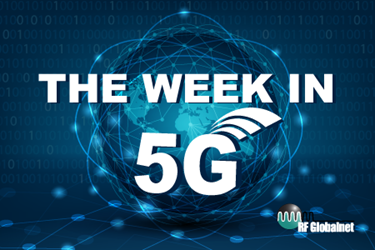The Week In 5G: 9/25/2018 – FCC Sets Tighter Deadlines And Fee Caps On Localities, Vodafone Makes UK's First Holographic Call
By Jof Enriquez,
Follow me on Twitter @jofenriq

In the latest move to streamline 5G deployment, the U.S. Federal Communications Commission (FCC) this week is set to vote on a proposal to impose tighter deadlines on localities and to limit the amount they can charge telcos installing small cells.
According to the draft order that is expected to pass, FCC will limit state and local governments to charging fees "that are no greater than a reasonable approximation of their costs for processing applications and for managing deployments in the rights-of-way." Moreover, it shortens the deadline for localities, from the previous 90 days to 60 days, to install small cells on existing structures, and a deadline of 90 days, down from 150 days, for reviewing new installations.
By "reducing excessive local fees for processing permits and allowing access to public rights of way, and addressing unreasonable delays in authorizing deployments" these updated rules should "make it easier to install wireless infrastructure," FCC Chairman Ajit Pai wrote in a blog post.
These new rules could cut off valid income for localities forging deals on their own terms, like the one made by San Jose, California with AT&T and Verizon that gets the city $750 annually for each of 4,000 light poles. Under the proposed FCC order, cities couldn’t charge more than it costs them to process applications and manage rights-of-way — an amount the FCC estimated at $270, according to Bloomberg.
"We are shocked,” Samir Saini, New York City’s commissioner of information technology, told Bloomberg. The proposed action is "an unnecessary and unauthorized gift to the telecommunications industry and its lobbyists” and an effort “to subsidize a trillion-dollar industry under the guise of helping broadband deployment."
FCC was quite clear in its order, though, saying that "we would expect local governments to provide all required authorizations without further delay."
While tighter caps and deadlines could streamline 5G deployment in the U.S., President Trump's tariff war with China could stymie 5G rollouts, according to an FCC commissioner.
The Register reported that FCC Commissioner Jessica Rosenworcel told an audience that tariffs will include 25 percent levies on essential networking components including antennae, switches, and routers. She reportedly said that the import levies are a "terrible thing" for 5G and are "not going to help us lead."
Speaking of routers, Huawei and Samsung said they will be producing more affordable 5G routers soon. According to MyBroadband, Huawei expects to deploy higher production volumes of its equipment in the second half of 2019.
"Huawei will provide a 5G indoor and outdoor CPE by 2019," said Huawei Consumer Business Group GM Likun Zhao. "Huawei expects the 5G CPE to support large-scale deployment around H2 2019."
Samsung told MyBroadband that the company is already selling its 5G CPE.
Meanwhile, Intel announced that it is expanding its portfolio of 100G silicon photonics transceivers for 5G infrastructure. The company said the new transceivers meet the bandwidth demands of 5G wireless fronthaul applications and are built to withstand the harsh outdoor conditions of cellular towers, with the capability to support optical transport to the nearest baseband unit or central office (up to 10 km).
Further development of 5G hardware will eventually allow use cases such as autonomous cars, augmented reality, and smart cities, to name a few. This week, Vodafone demonstrated another: holography.
Vodafone conducted Britain's first live holographic call featuring a 3D image of a person standing in a studio in Manchester, northern England, to a virtual-reality headset at its headquarters in Newbury, west of London, reported Tech Central.
Holograms are not just a gimmick, but rather “a natural evolution of videoconferencing, but adding a 360-degree, more immersive element,” said Vodafone UK CEO Nick Jeffery.
Vodafone UK sees its 5G network fully operational by 2019. Starting in October 2018, 5G tests will be conducted in seven cities, continuing with full launches in London, Manchester, Liverpool, Birmingham, Cornwall, and the Lake District in 2019, then expanding to 1,000 5G sites by 2020, according to Venture Beat.
Meanwhile, Vodafone Spain, in association with Chinese vendor Huawei, announced that it has put up the first 5G network nodes in the world at La Nave, an urban innovation space situated in the Spanish capital city of Madrid. The node will support various 5G demonstrations in support of the carrier's NB-IoT network launched last year across Spain.
Meanwhile, Germany's 5G plans continued to face delays. German's telecoms regulator BNetzA, Germany’s big-three mobile operators, and lawmakers remain at loggerheads over the proposed terms of a 5G mobile license auction. According to Reuters, the auction build-up has been marked by clashes over which frequencies should be auctioned first, as well as whether the auction should enable the entry of a fourth operator to challenge Deutsche Telekom, Vodafone, and Telefonica Deutschland.
"I seriously doubt that this draft can serve as the basis to fire the starting pistol for the 5G network buildout," Ulrich Lange, deputy chairman of the conservative parliamentary group behind Chancellor Angela Merkel, said after a meeting of the BNetzA advisory council.
By contrast, India's own spectrum auction is right on track. Telecom Secretary Aruna Sundararajan Sunday told The Economic Times that that planned auction for 5G services is likely to happen in the later half of 2019. The government intends to give experimental licenses for telcos to develop test beds to evolve a full-fledged ecosystem.
Related, state-run telecom firm BSNL announced an agreement with Japan's Softbank and NTT Communications to roll out 5G and internet of things (IoT) technology in India. BSNL will tap its partners' network of 900 satellites to provide high speed internet services, reported Business Today.
